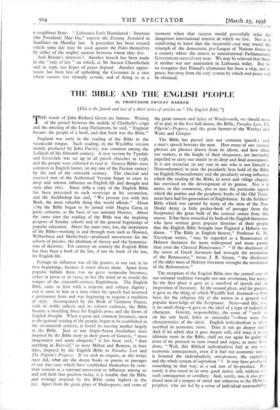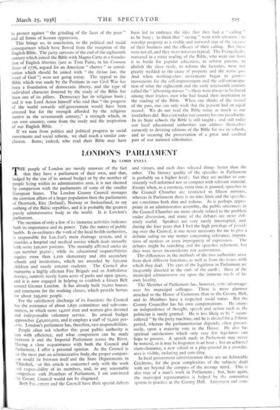THE BIBLE AND THE ENGLISH PEOPLE
By PROFESSOR ERNEST BARKER
[This is the fourth and last of a short series of articles on " The English Bible I THE words of John Richard Green are famous. Writing of the period between the middle of Elizabeth's reign and the meeting of the Long Parliament, he said, "England became the people of a book, and that book was the Bible."
England was early in the reading of the Bible in the vernacular tongue. Such reading, in the Wycliffite version mainly produced by John Purvey, was common among the Lollards of the fifteenth century. A new version by Tyndale and Coverdale was set up in all parish churches in 1538, and the people were exhorted to read it. Geneva Bibles were common in English homes (at any rate of the Puritan variety) by the end of the sixteenth century. The classical and received text of the Authorised Version began to exert its deep and solemn influence on English life and thought and style after 1611. Since 1689 a copy of the English Bible has been presented to each sovereign at his coronation, and the Archbishop has said, " We present you with this Book, the most valuable thing this world affords." About 1789 the Bible began to be joined with Magna Carta, in party cartoons, as the basis of our national liberties. About the same time the reading of the Bible was the inspiring purpose of Sunday schools and of the general beginnings of popular education. About the same time, too, the inspiration of the Bible—working in and through men such as Howard, Wilberforce and Shaftesbury—produced movements for the reform of prisons, the abolition of slavery and the humanisa- tion of factories. For century on century the English Bible has thus been a book of the law, if not the book of the law, for English life.
Perhaps its influence was all the greater, at any rate in its first beginnings, because it stood almost alone. Apart from popular ballads there was no great vernacular literature, either in prose or in verse, to fire the mind or to mould the temper of the sixteenth-century Englishman. The English Bible came to him with a majestic and solitary dignity ; and it came to him at a time when his speech had assumed a permanent form and was beginning to acquire a tradition of style. ' Accompanied by the Book of Common Prayer, with its noble collects and its solemn cadences, the Bible became a moulding force for English prose and the forms of English thought. When a great and common literature, open to the general reading of the people, began to be established in the seventeenth century, it found its nursing mother largely in the Bible. Just as our Anglo-Saxon forefathers were inspired by the Bible story to their poem of Genesis, " more imaginative and more eloquent," it has been said, " than anything in Beowulf," so were Milton and Bunyan, in later days, inspired by the English Bible to Paradise Lost and The Pilgrim's Progress. If we seek to enquire, as the writer once did, what are the dozen books or poems or passages of our liter !titre which have established themselves by com- mon consent as a national possession or influence among us and still hold that position today, it is notable that the Bible and writings inspired by the Bible come highest in the list. Apart from the great plays of Shakespeare, and some of the great sonnets and lyrics of Wordsworth, we should most of us put, in the first half dozen, the Bible, Paradise. Lost, The Pilgrim's Progress, and the great hymns• of the Wesleys and Watts and Cowper.
The Bible has passed into our common speech ; and a man's speech bewrays the man. How many of our current phrases are phrases drawn from its idiom, 'and how often our orators, at the height of their eloquence, are inevitably impelled to carry our minds to its deep and final associations. It is not sectarian (at any rate in one who is not himself a Nonconformist) to note the peculiarly firm hold of the Bible on English Nonconformity and the peculiarly strong influence which the reading of the Bible, in town and village chapels, has exercised on the development of its genius. Nor is it amiss, in this connexion, also to note the particular appeal which the psalms and the prophetic books of the Old Testa- ment have had for generations of Englishmen. In the Soldiers' Bible which was carried by many of the men of the New Model Army (a little pocket-book of passages from the Scriptures) the great bulk of the content comes from this source. It has been remarked by both of the English historians who have written great popular histories of their people that the English Bible brought into England a Hebrew tra- dition. " The Bible in English history," Professor G. M. Trevelyan writes, " may be regarded as a Renaissance of Hebrew literature far more widespread and more potent than even the Classical Renaissance." " If the disclosure of the stores of Greek literature had wrought the revolution of the Renascence," wrote J. R. Green, " the disclosure of the older mass of Hebrew literature wrought the revolution of the Reformation."
The reception of the English Bible into the central core of our national tradition wrought not one revolution, but many. In the first place it gave us a standard of speech and an inspiration of literature. In the second place, and far greater, it gave us the thing of which Wycliffe had dreamed—a firm basis for the religious life of the nation in a general and popular knowledge of the Scriptures. Next—and this, too, is no small thing—it gave us the ideal of a type of individual character. Gravity, responsibility, the sense of " each as on his sole head, faller or succeeder "—these were the characteristics of the ideal. English individualism is often ascribed to' economic roots. Does it not go deeper still ? And if we admit that it goes deeper still, and trace it to its ultimate roots in the Bible, shall we not again be guilty of error if we proceed to turn round and argue, as some have done, " Well, this Biblical individualism had at any rP'e economic consequences, even if it had not economic root' it fostered the individualistic entrepreneur, the capitali,r, and the whole system of capitalism " ? It may have produced something in that way, as a sad sort of by-product. But surely it also stood in its own good native self; without any such consequence or corollary. And, surely, too, it also prc- duced men of a temper of mind not unknown to the Hebrew prophets who are led by a sense of individual responsibility to protest against " the grinding of the faces of the poor " and all forms of human oppression.
This brings us, in conclusion, to the political and social consequences which have flowed from the reception of the English Bible. The party cartoons of the end of the eighteenth century which joined the Bible with Magna Carta as a founda- tion of English liberties (just as Tom Paine, in his Common Sense of 1776, argued for an American " charter " or consti- tution which should be joined with " the divine law, the word of God ") were not going astray. The appeal to the Bible which was made by the Puritans in our Civil War has been a foundation of democratic liberty, and the type of individual character fostered by the study of the Bible has been one of its pillars. DemoCracy has its religious basis ; and it was Lord Acton himself who said that "the progress of the world towards self-government would have been arrested but for the strength afforded by the religious motive in the seventeenth century," a strength which, in our own country, came from the study and the inspiration of our English Bible.
If we turn from politics and political progress to social movements and social reform, we shall reach a similar con- clusion. Some, indeed, who read their Bible may have been led to embrace the idea that they had a " calling " to be busy ; to think that " saving " went with salvation ; to worship property as a visible and outward sign of the sucees of their business and the efficacy of their calling. But these were not all, and they were not even typical. The Evangelicals, nurtured in a strict reading of the Bible, who went out from it to battle for popular education, to reform prisons, to abolish the slave trade, to reform the factories, were not greatly wedded to the cause of property and the status quo. And when working-class movements began to grow— movements for the self-improvement and the self-emancipa- tion of what the eighteenth and the early nineteenth century called the " labouring masses "—there were always to be found among their leaders men who had found their inspiration in the reading of the Bible. When one thinks of the record of the past, one can only wish that the present had an equal record. We do not read the Bible today as much as our forefathers did. But even today our country has one peculiarity. In its State schools the Bible is still taught ; and still today our local educational authorities can address themselves earnestly to 'devising editions of the Bible for use in schools, and to securing the preservation of a great and cardinal part of our national inheritance.











































































 Previous page
Previous page